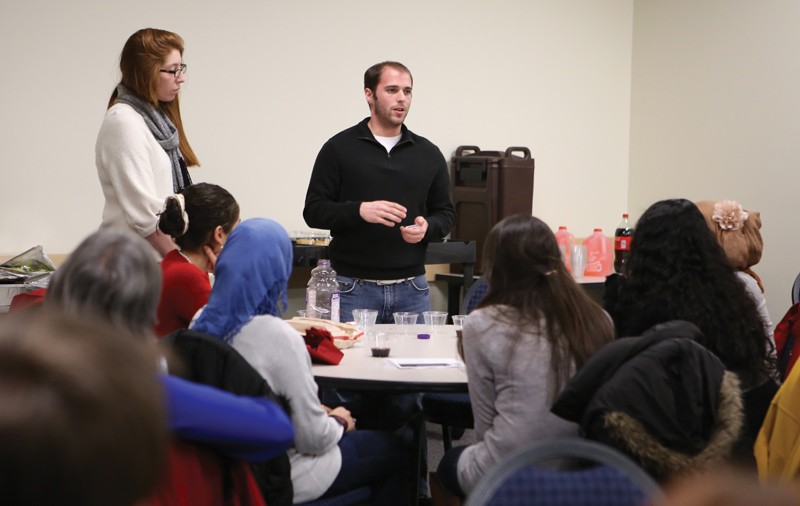Muslim, Jewish students share fellowship to remember 2010 death

GVL / Robert Mathews GVSU students Lucy Keller (left) and Noah Zucker (right) speaking during Avi Shabbat.
Feb 10, 2013
In typical fashion, the Jewish Hillel group at Grand Valley State University broke bread together Friday night as they celebrated Shabbat, or the Jewish day of rest. But this bread passed through different hands and had a deeper significance than usual.
Even as the Israeli-Palestinian conflict fostered continued tension around the world, GVSU’s Muslim and Jewish students sat in peaceful fellowship and inquired after one another’s families, journeys to their homelands, futures and religious traditions.
Hillel President Noah Zucker said the Jewish organization invited the Muslim Student Association to participate in a meal to honor Avi Schaefer, a Jewish Brown University student who worked to improve Muslim-Jewish relations before being killed by a drunk driver in 2010.
The Jewish student group received a grant from the Avi Schaefer Fund to host a dinner for Muslim and Jewish students at GVSU on the night before Schafer’s yahrzeit, or anniversary of death, celebrated by the Jewish people. “I’m hoping that there’s many more to come,” Zucker said.
Hillel hosts a Shabbat meal every other Friday night, but this was the first time an official invitation was extended to students of other faiths.
The peaceful night shared by the Muslim and Jewish students is not an anomaly, though. Zucker said the two groups have a good relationship at GVSU compared to other places around the world or even other campuses in Michigan.
“Compared to other campuses it’s really good because there’s a lot of campuses where there’s, at least from our standpoint, a very active anti-Israel sentiment on many campuses around the country, and here there doesn’t seem to be either pro or against either side,” Zucker said. “It’s just kind of a not talked about issue, which is better than not, but for me I’d like to see it as we can do things together and show that we’re friends and be peaceful about it and show kind of a united front, so that’s kind of what we’re getting at.”
Zucker said he senses no tension between the groups at GVSU, and MSA President Zeana Khodor agreed.
“I think there’s a real big misconception that Jews and Muslims don’t get along, so I think this will promote togetherness, and I think it’s a good opportunity to learn about a religion we don’t know much about,” Khodor said.
Zucker added that he hopes the effort to make peace at GVSU eventually resonates with the rest of the world.
“I think we’re kind of a ways off in terms of the whole world perspective of everything, but little by little I would hope that it goes there,” Zucker said. “I don’t know how realistic that is in our lifetime, which is sad, but I think there’s just too much hatred on both sides. But I think smaller things like this is how you can start to change it, you know, like people like this become friends.”
As GVSU students come to know one another’s faiths, they can spread their understanding to their families at home and back in their original countries, Zucker said.
“A lot of our students have been to Israel before, a lot of them have been to their home countries, so you go back there and you talk to your families (about this),” he said. “It’s small things.”
Khodor said this is the first event that Muslim and Jewish students gathered together for the purpose of fellowship. “I think we’ve always gotten along but I think we still can make us closer,” she said.
And while bridging the gap between Muslim and Jewish students at GVSU may not have immediate worldwide consequence, it stands to testify that good relations are possible between the two groups often seen at odds.
“I think when we make our relationship stronger it will promote peace and less ignorance in the world, I guess, and it’s always good to learn about another culture or religion,” Khodor said.

























